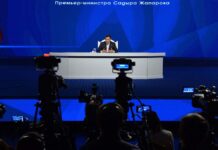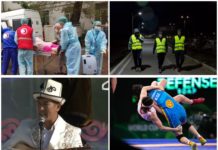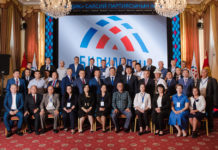March 8, 2020, will go down in history as a day of open violence against women’s rights activists in Kyrgyzstan. On that day, unknown assailants destroyed protest materials, physically attacked women who were peacefully protesting, and threw stones and eggs at them. The police ultimately arrested about 70 people — all of them march participants. A year later, Kloop has compiled testimonies from the victims about the protest, the violence they experienced, and the future of their activism.
Aizirek Imanaliyeva
march participant
This was my first International Women’s Day march. I had prepared for it. But before the protest even began, we were attacked by a group of «national patriots». I was shocked by how aggressive they were. They destroyed everything we had worked for. They could have just attacked us, but they decided to break everything, too. They stomped on our nail buffers that had feminist symbols on them.
When I saw the policemen, I ran to them, I thought they would help us. But they just grabbed me and took me to the bus, where other women from the march were already being held. Everyone was shouting, and tears welled up in my eyes.
That’s when I realized the police had betrayed us, because it’s our constitutional right under Article 34 — «The right to freedom of peaceful assembly».
Ultimately, I even lost my respect for kalpaks [a traditional Kyrgyz hat and a symbol of Kyrgyzstan]; I’m starting to fear people who wear kalpaks. Because all kyrkchoroshniki [national patriots] wear kalpaks, discrediting them. And I’ve definitely lost respect for policemen.
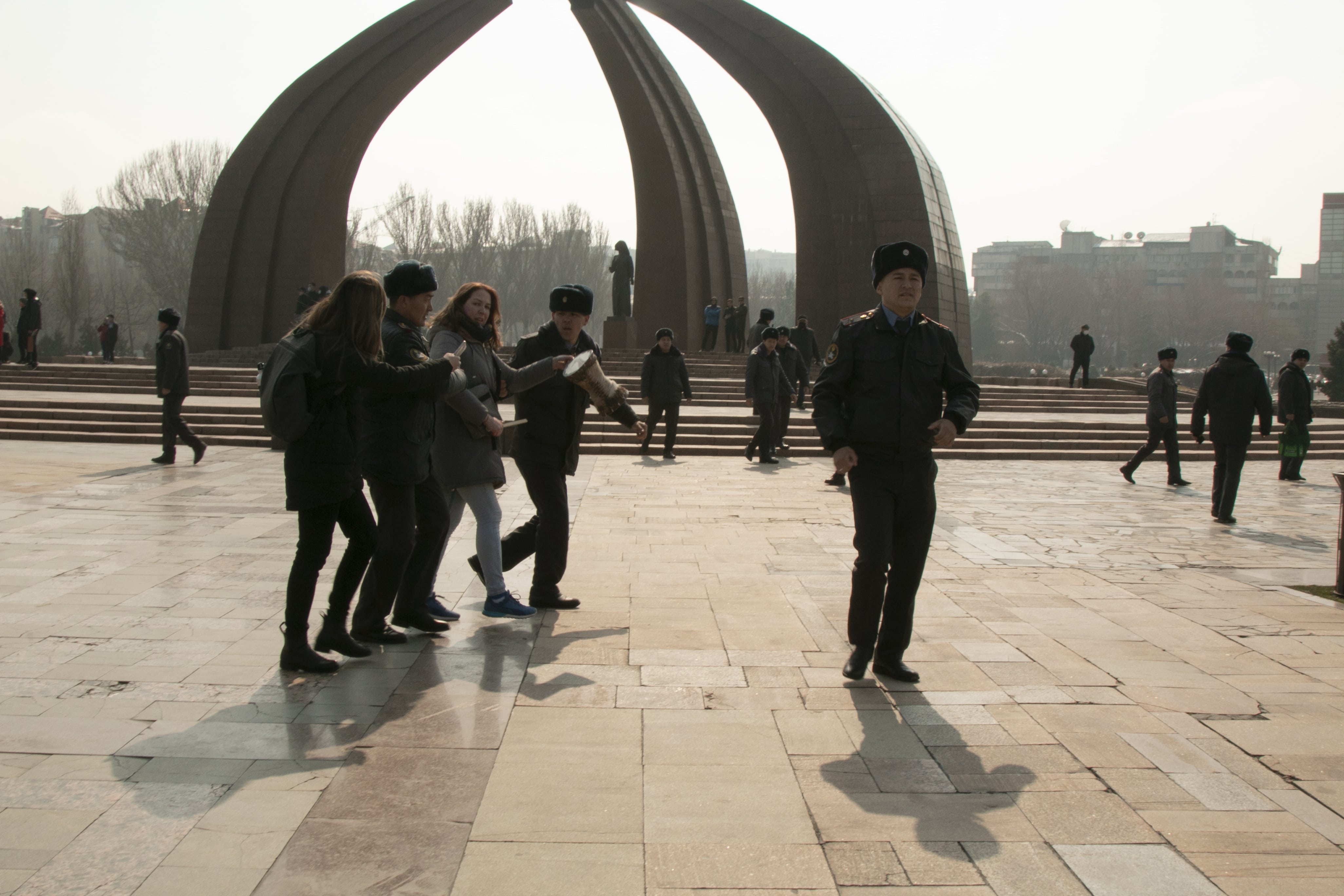
Savia Khasanova
march participant
I heard screams, turned around, and saw them wrecking everything; I saw people running away, police officers, and crying protesters. In total shock, I started picking up whatever props were still in one piece.
I remember picking up a drum. I hugged it and thought I should save it. I started to turn around to see what else I could pick up. Suddenly, some new group of people, both men and women, ran up. They started to wrest the drum from me. At some point, I saw a policeman coming toward me. He took me by the elbow, I said, «Save me! Help me! What’s going on?» And he said, «Come with me».
The policemen took the drum away from me and took me to the bus. That’s when I realized the march was ending before it had even begun.
In the bus, women were screaming and demanding to be released. I felt like there had been some kind of misunderstanding — why had they detained us? But by the time they had brought us to the police department and we were standing outside it, I realized that they had detained exactly who they had planned to detain. It was a planned provocation and a planned detention.
I felt betrayed, I felt a searing sense of injustice. It felt like someone had come into my home, robbed me, destroyed it, and I’d called for help, but instead of help, I’d been framed as an accomplice to the crime. And then there was the blatant feeling of helplessness and resentment. Not only had we been deprived of our constitutional right to protest peacefully, we’d also been punished for it.
But then came the feeling that the truth was on our side, and it overpowered the feeling of helplessness. I realized that if they were going to act this way with us, it should give us even more strength to fight. And truly, now we’re not only fighting gender discrimination, we’re also fighting law enforcement officials, who behave like typical domestic abusers, degrading and beating their partners or wives.
No, on the contrary, our spirits rose. Personally, I’m working on more projects dedicated to themes like gender equality, femicide, and domestic abuse. I feel a certain strength in this regard. At the next march, I’ll come out with the message that we need to be talking about this constantly.
Tatyana Zelenskaya
march participant
I go to every Women’s Day march. That time, my sister and I agreed to go together. We arrived 10 minutes before it started, walked up, and saw rocks flying. It was a little strange. I saw flags, a lot of purple, then I walked over and saw rocks flying toward us and guys in kalpaks running at us.
That was the scariest moment, because we were just so confused. I didn’t get hit by any rocks or men, because we didn’t make it all the way there. But we were walking that way, and I saw how they were beating protesters. It made me so angry, someone threw a purple banner, and my sister said, «Let’s pick it up, let’s give him a response». I started to pick up the banner, and then the police grabbed me.
I had still been thinking, well, where, where are the police, where are they? We were being attacked by bandits. When I saw them running, I thought, «Hooray, the police are coming!» But they grabbed hold of me.
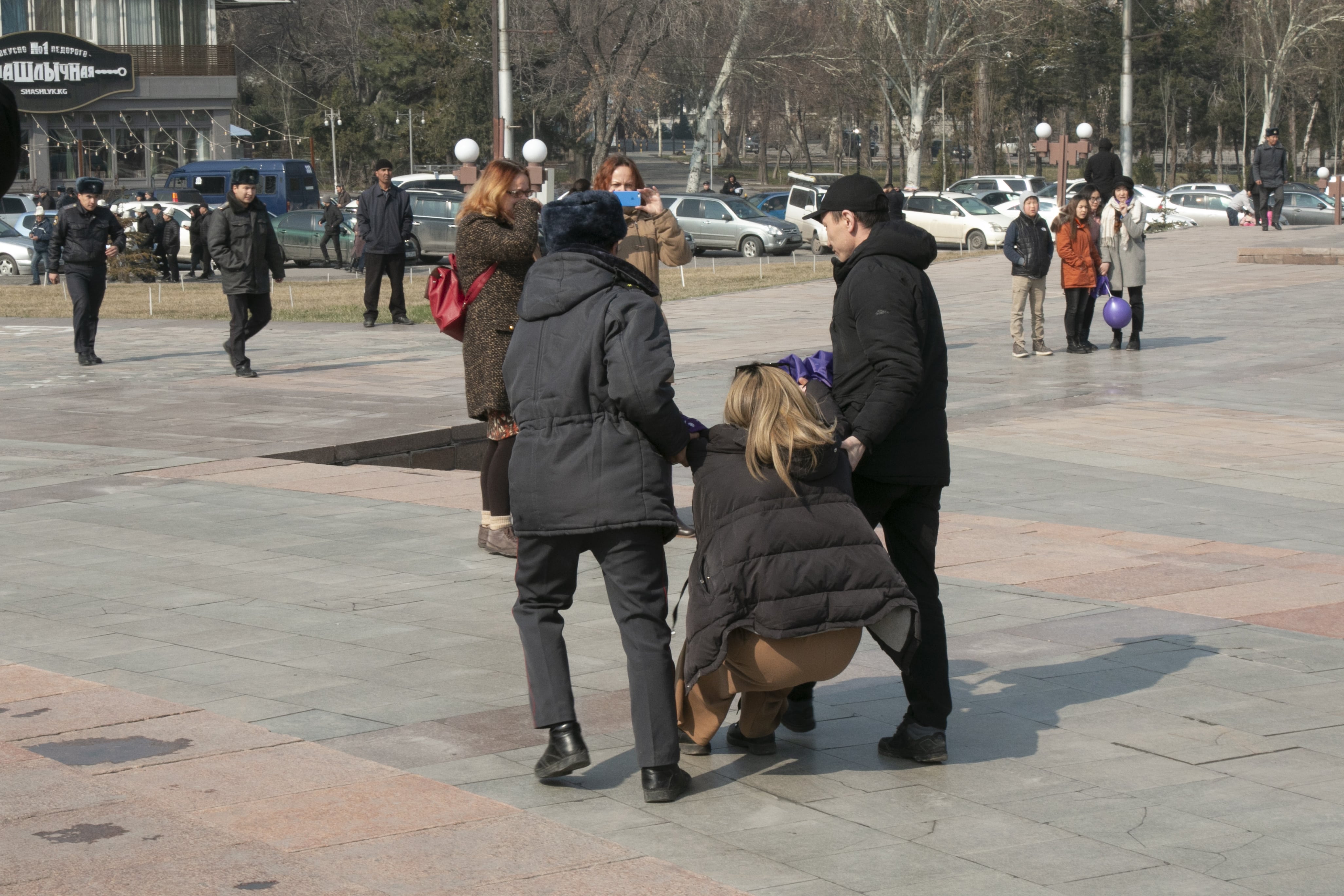
But the march continued at the police department building. They probably expected us all to be scared, because when you end up in police custody, you’re on their territory, under their rules. But now there were too many feminists coming, and they set their own rules. We kept yelling chants, and to me, it was an act of art.
I really don’t want to discount the feelings of other women. I saw how hard it was for a lot of them; one woman had a panic attack, some of them were really roughly detained, there were signs of beatings. I was really worried about my mom finding out, because she would have been very worried.
The following morning, I was enraged. And because drawing is my main tool for communicating, I realized I needed to draw, to find some way to talk about what happened. I drew a self-portrait, I tried to convey the way I was feeling. A large space, a lot of air, you’re being led, and you’re suffocating because everything is so unfair.
This year, despite the fact that my relatives will be completely opposed to it, I’m all the more determined to go to the march. I think that for a lot of women, it will just be another reason to go to this year’s march.
Adilet Imanaliyev
march participant
I remember standing there and watching what was happening. I was shocked, because I hadn’t expected anything like it. When they detained an activist I knew, I began following her and the police officer, asking, you know, what they were doing, what the reason was. I tried to stop them. But they ultimately got me, too, and took me to the police vehicle along with her. But while we were walking, I asked on what grounds they were detaining us. The police officer started beating me on the back to get me to shut up and calm down.
I started yelling even more, about how what they were doing was illegal. The media came over and he settled down. But after that, they held us for a long time at the police department, and when they let us go, I was struck by how many people were waiting outside. Some of my acquaintances brought me to a safe place, as I wasn’t feeling safe at that moment, especially around the police.
Later, I took pictures of the bruises and wrote a statement, but they didn’t consider me a victim for eight more months, even though they could have after two or three weeks. But the authorities dragged the process out for eight or nine months. I think it’s a glaring example of how they didn’t want to investigate. And of course they didn’t punish anyone.
The officers who arrested me are still «protecting» people’s rights. Other than me, one other activist was recognized as a victim, but just like in my case, nobody was held responsible.
It was hard to move past it, especially since lockdown began soon after because of COVID-19 and we were all sitting in isolation. It was then that I began to understand how much psychological trauma this had had on me. I live alone, and whenever I was sitting at home and heard something rustle, I imagined that kyrkchoroshniki or cops were going to come in and beat me. Even though you would think that police beating people is something new, unacceptable. But in Kyrgyzstan, as it turns out, it’s a normal thing.
If I don’t help myself, nobody will help me — that’s the slogan I live with. Yes, of course, they’ll beat me, I’m ready for that, and in some places it’s scary, of course, but I’m not going to stop.
Alina Anisimova
march participant
I felt something hit me, but I don’t know exactly what it was. Later, at some point, it became clear that they were throwing eggs, but this was definitely not an egg. I grabbed my friend by the arm and we ran. We didn’t know what we were running from, and it was scary. My friend got separated from me, and later I saw that they were leading her away. There was a commotion, and I decided to ask a police officer what the hell was going on.
Instead of an answer, three men started pulling me into the bus. In the bus, I started crying at the shock of it all. I had a broken collarbone, and because of the rough way the policeman handled me, my hand was hurt badly. But the other women and I started chanting slogans, and when we arrived [at the police station], other people were already outside chanting slogans as well. What was there for us to do? It was totally unclear where they were taking us, what they wanted from us. Nobody explained anything to us.
When we were brought to the police station, someone grabbed me by the arm, and I started yelling: «What the hell, let me go, just tell me where to go and I’ll go. There’s nowhere for me to get away to, so why are you grabbing me? To show your strength? I don’t understand».
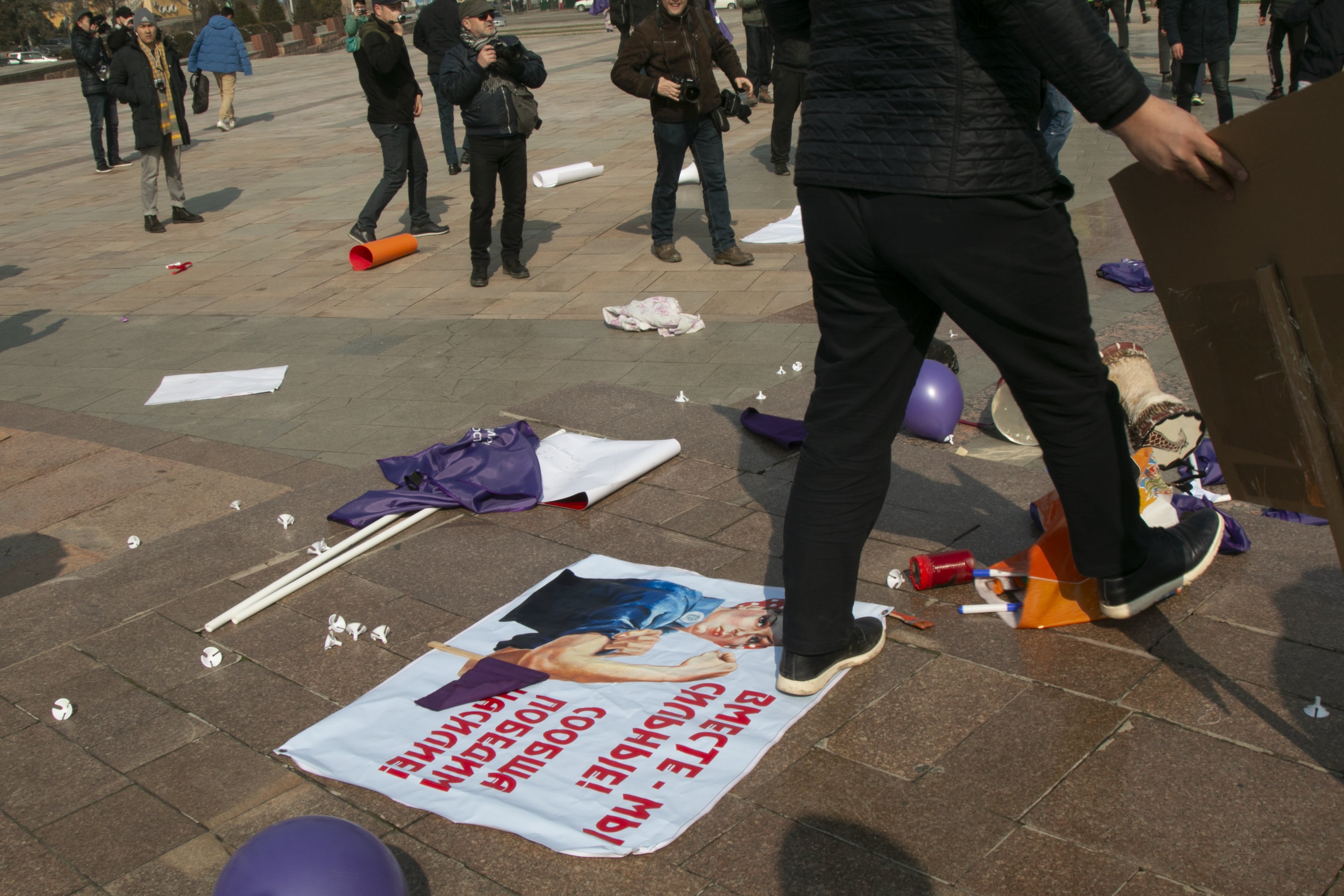
Most likely, this was deliberate, they were hurting us to show, you know, ‘this is how we behave.’ It wasn’t a beating, but it was rough. Intentional.
Before that, I understood what our country’s situation was like, how people view women and women’s rights. But I still had some hope, deep down, that our law enforcement agencies would at least protect us somehow. But that situation left me totally disappointed.
I don’t want to believe anybody, and our government is first on the list of who I don’t believe.
After the march, I felt depressed for a few more days. I didn’t write a statement, although I did go to a traumatologist and get a certificate that I was bruised. It’s difficult, it’s a very labor-intensive process. Going to court is always a labor-intensive process, especially when your case is related to a protest. It’s not that I chickened out. It’s just that the fact that the police had detained us already told me that the state was not going to listen to us, that the government wouldn’t care. Eventually, our activists were fined.
But I’m convinced we need to go to these marches. And I’m convinced our strength is in our solidarity, because the more of us there are, the stronger we are.
I’ll definitely go —I’ve already been going to the march for four years, and I don’t want to miss a single one.
Anna Kapushenko
march participant
I knew that if I resisted, the only thing I would accomplish would be giving myself some injuries. Maybe some other severe psychological trauma, because, ultimately, if law enforcement officials have been given an order to detain you, they’re going to detain you, and no amount of begging or pleading will have any effect on the situation.
I was one of the first people to end up on the bus. It was only later that they brought other women and human rights workers.
When they brought us to the Sverdlovsk police department and left us outside, the other women started chanting. My activism, though, shut off in that moment. I just wanted to record what was happening — take a video, record voices, and send it to the paper.
But it still makes me angry how a police officer broke my poster. Me and my colleague Savia came to the march with portraits of women who had been murdered by their partners. There had already been six cases since the beginning of the year — these women had died as a result of domestic violence. I had just written an article about domestic violence, and it had really had an effect on me.
And since the murders had happened in a domestic environment, I put two portraits on a dustpan and broom — after all, it’s women who end up responsible for household chores. And it was at the police department that one of the officers ripped up my poster with the dustpan and broom, which was wild. I mean, nobody even cared about the posters by that point.
It wasn’t clear what they were going to do. Their bosses came and tried to intimidate us. They said, «If you don’t settle down, we won’t speak with you». It made us even angrier because, in addition to detaining us and not explaining what was going on, they were now trying to threaten us. And to wish us a happy International Women’s Day, which felt like mockery. It lasted three hours, and then we left safely.
But the period right after the march was the scariest part, because when you’re in such a stressful situation, you don’t feel any fear. Besides that, I started covering it all. Some kind of mental block kept me from perceiving it as being as terrible as it was. But when we left, it really shook me up. I saw the violence that had taken place, and it left a nasty residue in my mind.
After that, I had disturbing dreams for several nights. One dream stuck in my mind. It went like this: It was like I was at school, and there were a lot of girls. We were walking through the halls, the lights were dimmed, dark. We had to get in a line, all standing naked, and they made us do something, like push-ups. Now I realize this dream was directly related to that feeling of fear, of obedience. And that feeling, as if we were exposed — it was humiliating. It was in my sleep that I felt the situation most deeply.
It was similarly hurt later on, when a lot of people tried to twist the events and say it was the women who had provoked everyone. They tried to turn the media campaign around, saying that the cops had been right to detain us. All of the arguments on social media, which were replicated everywhere else, they caused me a lot of pain, because we hadn’t done anything to make them arrest us, or to make them drag us through the mud afterwards.
Some people kill others. Other people steal millions of dollars. And other people commit other crimes, but none of those people are detained publicly like we were. We were detained and put out like scarecrows, as if we’d done something terrible. Even though we just say simple things, like how women in Kyrgyzstan don’t have enough rights, and that we need to fight for our rights. And it’s in these kinds of situations that we’re told we already have a lot of rights, but you see, we don’t even have the right to go to a rally. It’s still not clear to me what was guiding the officers when they arrested us instead of our provocateurs.
The Supreme Court, which made the decision about the case, was also very stealthy. The court didn’t say the officers were in the wrong, and at the same time they didn’t say that their actions were legal. They were very intentional about this decision, and to this day, we haven’t been able to achieve justice.
I hope we’ll achieve it this year. I hope law enforcement doesn’t come to break us up, and I hope we turn back into that wonderful country that always held a march for women’s rights on March 8.
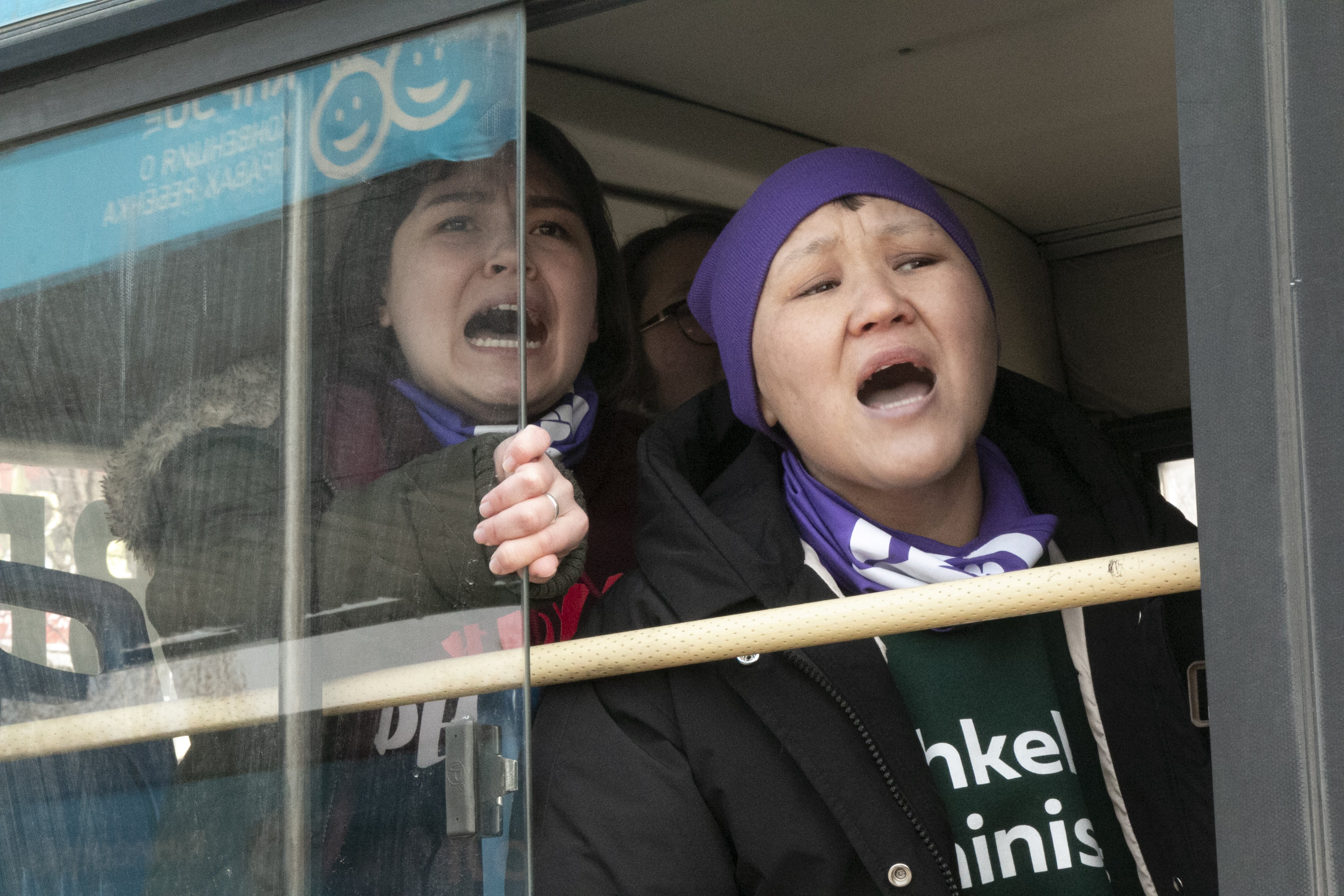
Maya Abdyldayeva
activist who was fined 3000 soms for «disobeying» police officers
After everything that happened, it was like the 2020 march activated all of my triggers, and they’re still active to this day. I was afraid, and I’m still afraid. If before I was afraid of police officers, now I’m afraid of all men. It opened my wounds.
Everything my memory had blocked out, it all came spilling out — the violence and abuse I survived. And the march… the detainment acted as some kind of catalyst. I began experiencing depression, which I’m now being treated for.
It also led me to strong feelings of burnout as an activist. It was also extremely disappointing; at some point, you just lose faith and hope, and those are the things the whole idea of activism rests on. These constant conversations, the constant stand-off with the government, with the authorities, with people in power, you just believe and hope that you’ll get through it. And then you see that you might not. And the scariest thing is when you think you’re looking at humans, but in their eyes and in their face you see such inhumanity and such indifference.
These people actually believe they’re right, and this fear is certainly an interesting feeling.
When we went to take pictures of our injuries, there were bruises on us. One woman I know had a sprained arm. They just put us by a wall, looked at us from afar, measured us with rulers, and that was it. There was no Istanbul Protocol, nothing that had to be in accordance with [norms], and they’d been taught this. They just gave me a form, and there weren’t even any certified photographs.
The forensic examination system doesn’t work very well in general. The court won’t take it into account because it’s not considered a legitimate grounds. It’s just absurd, when you present a judicial body with documents that prove that you were bruised by a police officer — that’s violence. All of this is violence. But the court doesn’t care.
But I’ll go to the march [this year] — one hundred percent. I’ll participate in the march on March 8. Probably because of the previous time, I’ve lost my fear of being detained. It’s probably something that’s always scary the first time, and then it’s fine. I’m not scared, but I still don’t want it to happen again. But I’m intentionally not participating in the organization process, I’m not even going to volunteer or be officially involved, because I just can’t.
Gulyaim Ayilchy
activist who was fined 3000 soms for «disobeying» police officers
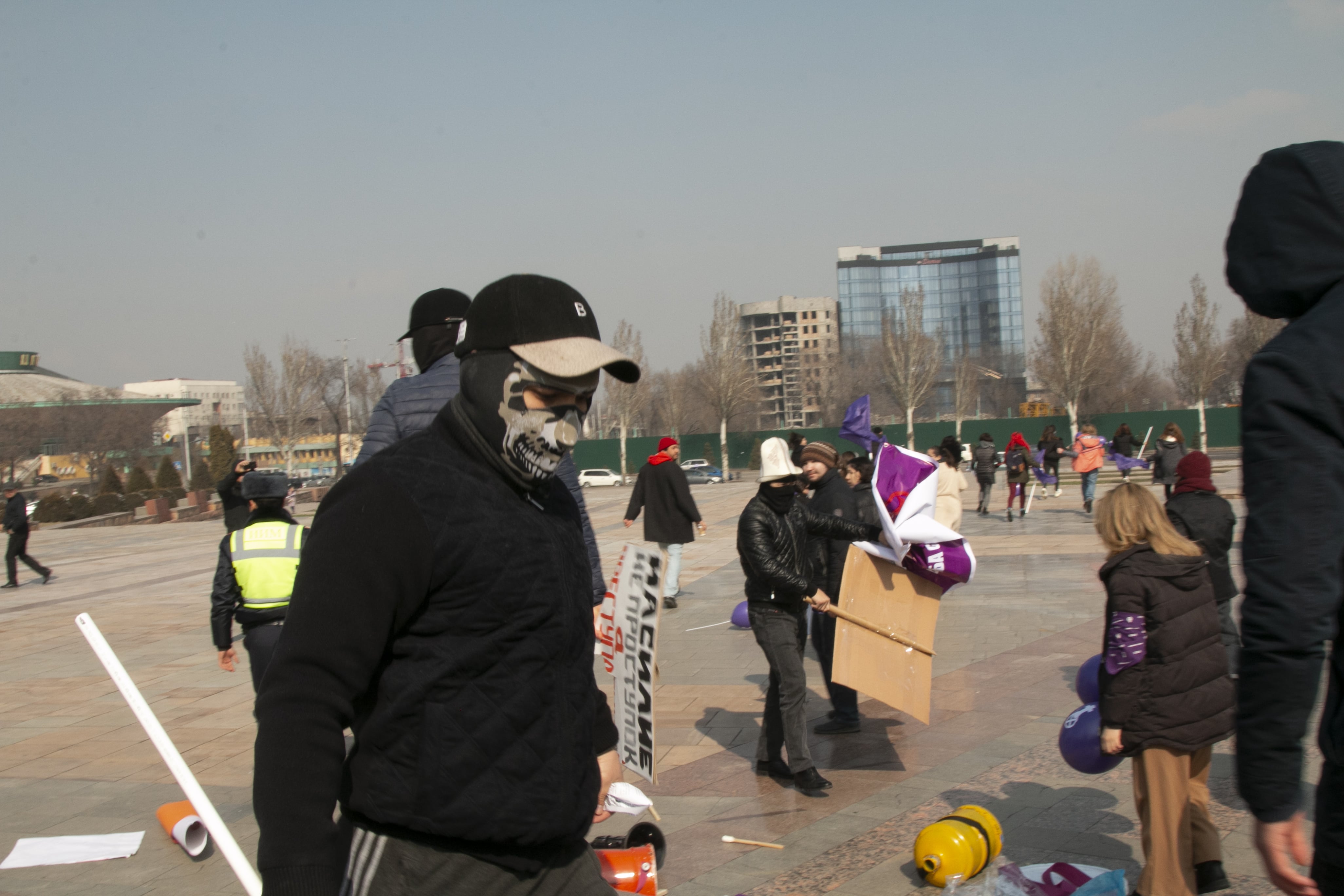
20 people had worked on this for two months, and now, after five minutes, everything was breaking down, scattered, trampled. I just stood there and looked at it all, and for a few seconds I was just numb. I thought, «How could this happen? How can you just come, destroy everything, trample on someone else’s work? And the police officers weren’t doing anything to these people. They all just stood there and watched». They detained me when I tried to defend one of our volunteers.
After that, inside the police station, we held a flashmob, «El violador eres tú», which translates to «The abuser is you», which we’d been planning for after the march. It’s usually done in the city center, and in public squares all over the world. But we did it inside the police department. It was quite symbolic, because the song’s words say that law enforcement agencies and courts don’t protect, that they’re also rapists, just like those who produce violence. We had to say it. Our flashmob was later marked on a map as the first one held in a police department building.
The worst part is that a year has passed and, still, nobody has been held responsible. They say that five people were detained, some ephemeral people who I haven’t seen and whose names I haven’t heard. We didn’t see these people, and there weren’t just five people, there were a lot more. And they can be found — it wasn’t like they ran up, ran away, and vanished.
We expected that there might be some provocations, we took some measures. But that they would attack us physically; hit us with sticks; break, crush, and scatter everything — we just didn’t expect that. When you see a lot of people with athletic builds in the same place as a lot of women, small children — I brought my own child that day — you get scared, you start fighting for your life, you start fighting back, struggling.
And then they used the footage of us defending ourselves to charge us with attacking and behaving aggressively. The courts were closed; they told us that it was for safety reasons, due to the quarantine. But at that same time, there were other court proceedings going on, and there were a lot of people there.
There were such funny situations — they accused me of behaving aggressively at the protest, and that’s why they detained me. Then, two minutes later, they tell me I used obscene language at the police department and that’s why I was fined. They couldn’t determine, and never proved, on what basis I was detained.
But I don’t think the march was ruined — we still held it, just not the way we had planned. We made our agenda known, because the march’s agenda was about violence against women. And the march itself showed that there really is violence, and that law enforcement agencies, the government, not only do nothing to stop it — they make the violence worse.
We all saw this in practice. We showed the entire country, and perhaps the entire world, that it exists and that it happens. A lot of people heard about it and learned about it. Maybe some people’s eyes were opened, maybe some people didn’t want to support feminism before, maybe some people didn’t want to think about it, and maybe some people didn’t know. But they all realized it, and now there are new feminists appearing; girls and women in rural areas have started to talk about it and think about it.
It was shocking, of course. It takes a while to get over something like that. But then you get used to it, you begin to understand that a lot of people live with it every day, and that we’re doing it for a reason, showing people that you have to keep on living, you have to keep on struggling. If we just say, «They scared us last year, so we’re not doing the march this time», then a lot of women and girls just won’t have anything to hope for. But this way they see that the struggle continues, that there’s a chance to change something.
Nadira Masyumova
one of the organizers of the march
By the time we’d arrived and set up all of our posters and megaphones, we could already see some strange men in masks descending on us. There were policemen as well.
When even more people started gathering, they started throwing eggs, and a crowd of men in kalpaks came out from the direction of the Eternal Flame. They started throwing all of our posters, all of our things, shoving people. They shoved my friend. They started taking everything amidst the commotion.
And I remember there were two young women, minors, some of the activists’ daughters. They were holding posters along with a purple feminist flag. I immediately realized the attackers had one main goal — to take away all of the symbolism, all of the posters. One guy started chasing the girls. I started chasing them, too, and I told the girls, «Drop the posters», and they said, «No, we won’t drop them». I realized they might have drawn them themselves, prepared them. I begged them to drop the posters, and he finally left them alone.
I remember there was a whistle and then the men started to disperse, and then the policemen ran in. I remember feeling joy when I saw the police. I assumed the other men were connected to the police, but I thought they were supposed to beat us up demonstratively, and then the police were supposed to protect us — it would be a nice story about how the people don’t like feminists but the police protect us no matter what. But they decided to go with a different scenario. I didn’t think they would start detaining activists, but then they started detaining us.
They didn’t detain me, but it made me angry how they were intentionally detaining activists and not paying any attention to the men. And all of our things were stolen — our megaphones, which also cost money, which people chipped in to buy, are gone. Nobody returned anything to us.
I was really scared when this was all happening, but I could feel that these wonderful women were nearby, who were also going through this, and that we could support each other. I think a lot of people found allies who they knew they could get through it with. We weren’t alone.
After the march, we gathered again and tried to decide what to do next. In particular, we started offering psychological support and legal help [to the participants].
A year passed, we gathered again and started discussing all the pros and cons, and ultimately we decided to hold another march. We decided that, overall, the march’s initial meaning was for women to go out and fight for their rights, specifically their labor and social rights. March 8 is a day for marching, it’s not a day for idyllic families.
Now, it seems like the right to hold any kind of peaceful protest at all is under threat. Including through the Constitution, as they’re planning to remove the part making it illegal for the government to ban marches that weren’t requested in advance. I think civic life is being restricted, and we always need to protect our boundaries — sometimes even by fighting or taking risks, even when we’re afraid it won’t be safe. It’s important to continue.
People often ask about the marches, about who they actually help. But the goal of the marches is to show how many people think and believe that women are people, too. Everyone who thinks so should go to the march, join in, and support our agenda.
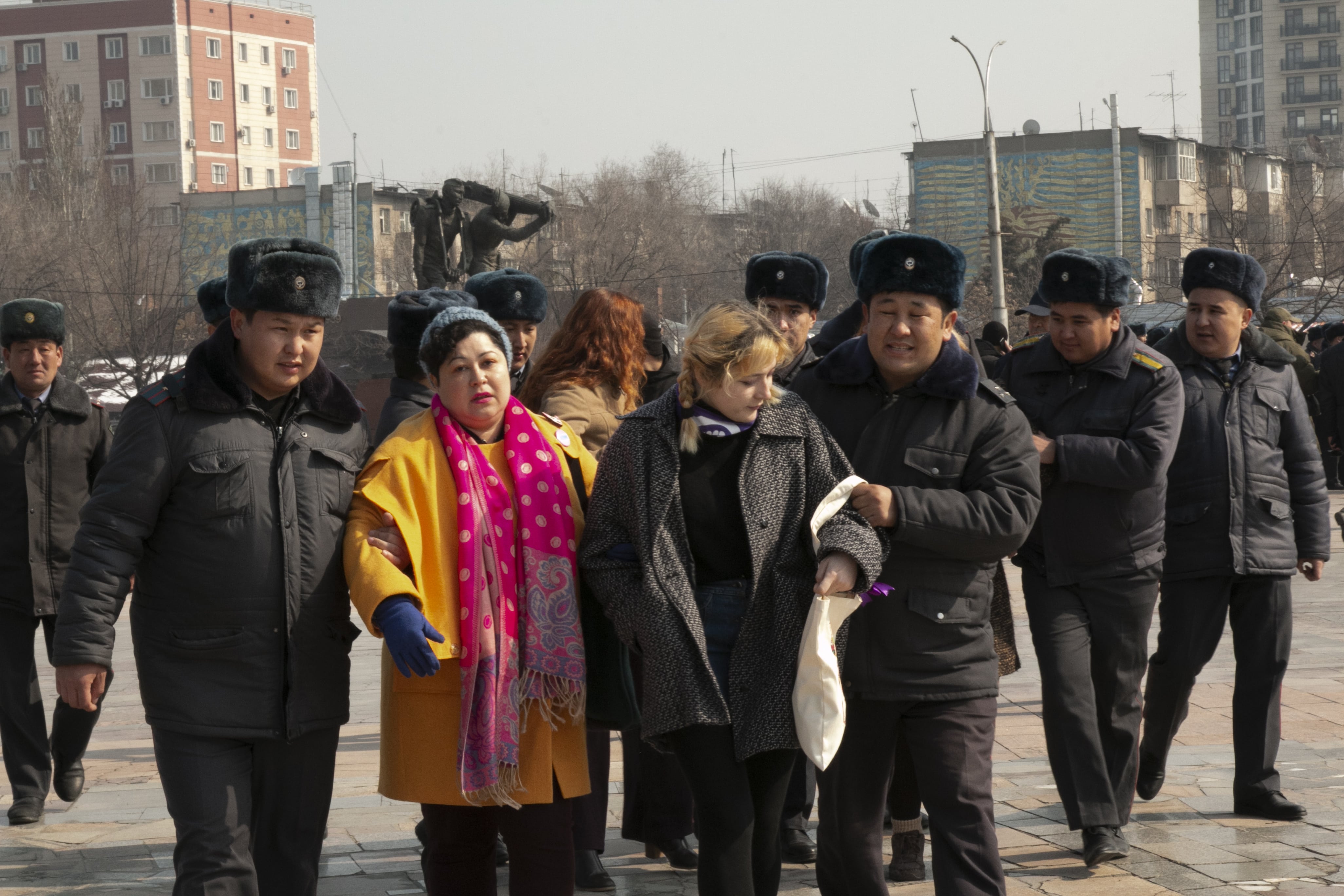
Mokhira Suyarkulova
activist who was fined 3000 soms for «disobeying» police officers
In 2019, the march attracted a lot of attention from society and the press. For some reason, a pretty large number of people came to the march. But it wasn’t the slogans, or the agenda we wanted to express at the march, that attracted our opponents’ attention as much as the presence of LGBT symbolism.
In no way do we want to disassociate ourselves from this. LGBT rights are part of the feminist movement. You can’t separate the words from a song. When we talk about gender, when we talk about freedom, all of this is there.
But this is inevitably used to discredit us. Although we don’t agree with it. We don’t consider ourselves discredited — we’re in complete solidarity. For us, it’s not slander. Yes, there are women among us who aren’t heterosexual and who aren’t cisgender. Their agenda is also part of the overall feminist agenda.
But in Kyrgyzstan, a certain tradition has developed in the last few years in which conservative forces, including state structures, parliament, political parties, and individual politicians find all kinds of ways to highlight and use LGBT issues and LGBT rights to discredit their opponents, to paint a picture of the «decadent West», which is supposedly trying to influence our politics.
What happened last year was the result of years of hidden attempts and attacks by the state on civic activism. On all of it, not just on some specific groups, but on all civic activists.
What happened last year, in our view, wasn’t the work of some marginal, radical groups — it was an expression of state policy. We’re confident that these anonymous people in masks who attacked us, and who still haven’t been brought to justice, by the way, were working together with the police.
In previous years, the authorities have tried to ban gatherings in specific parts of the city through court rulings, because they knew we were preparing the march. They always found different reasons. The usual reason was «to prevent us from interfering with people’s March 8 celebrations».
Before the previous march, activists had received phone calls from people pressuring them or even threatening them. It was a regular occurrence. But what happened in 2020 was traumatic for us as a movement. At the same time, it was a moment of growth. It served to reveal some internal contradictions, and a significant political consciousness emerged.
Everyone who went through the situation suffered major trauma as activists. Meaning that, while they were certainly willing to take risks, and willing to come out even after being threatening, when you’re actually faced with a situation like that one, you experience such fear, such insecurity.
In our society, it’s generally accepted to blame victims for whatever violence has been committed against them. This actually still happens. They tell us, «Well, why did you go out? See, you shouldn’t have. See, you were warned, and you still went out».
It’s exactly what women face when they’re subjected to violence: «You should have just quietly put up with it», or «Why did you go out so late?» or «Why did you wear a dress like that?» There’s always some justification. For some reason, it’s not the abuser and his violence actions that upset people; their impulse is to blame the victim.
As the event organizer, I was fined for disobeying police officers’ legal demands. We disputed the fines. Just recently, one of the women’s charges was dismissed by a lower court. There are supposed to be similar hearings for our cases, but the dates still haven’t been set.
We hope they acknowledge that we were illegally fined, at least on a small level, as well as the fact that we were illegally detained for exercising our constitutional right to peaceful assembly.
In my case, I arrived at the protest, approached my friend, who was crying, and then I was detained. The police officer didn’t announce himself, didn’t say anything, didn’t say, «You’re being detained for such-and-such reason, show me your documents».
There wasn’t anything like that, they just grabbed us and put us on the bus, which was completely full. It was the last bus, and there were already police officers inside. Packed like sardines, we went to the station.
At the police department, they invited us to speak with officers and investigators, on the first floor. Everyone else was held in the assembly hall on the second floor. They asked, «Who are the organizers?» We went downstairs, where they kept us in a cold hallway for a long time, we just stood there. It wasn’t until the end that they invited us into one of the individual offices where they were drawing up the documents.
One of the police officers ruined my passport. He ripped it while making a copy. He also refused to give me a copy of the report, which is against the rules. I told him I wouldn’t sign the report, and he said, «Then I won’t give you a copy». And then there were the trials.
But the march wasn’t illegal — quarantine still hadn’t begun. At that point, there hadn’t been a single case of someone getting coronavirus in Kyrgyzstan. When we go to peaceful marches in Kyrgyzstan, we’re exercising our rights. We don’t have to ask anyone’s permission to exercise our rights. It was a day off, an official holiday in our country. Ultimately, every woman has the right to go out for a walk. We hope everything will be safe this year. Even celebratory.
Our theme this year, if you read our announcement, is women’s happiness. March 8 has turned into a day of compulsory women’s happiness the way it’s demanded by the patriarchy. We want to redefine the concept of «women’s happiness». We’re going to talk about how women’s happiness is the freedom to gather peacefully, it’s free healthcare, education, the absence of discriminaton on any grounds whatsoever, it’s the freedom of self-expression.
Context:
On March 8, 2020, while holding peaceful protest march, feminist activists were attacked by unknown men in masks. Some of the men were wearing Kyrgyzstan’s national headgear, kalpaks. The police didn’t prevent the attack, and detained about 70 march participants.
In a court hearing immediately after the march, seven of the march organizers were fined three thousand soms each for «disobeying» police officers. The court later overturned the decision in one of the seven cases.
Out of 10 people who went to the Kyrgyz National Security Committee, only two were recognized as victims of police actions. Nobody was punished for attacking or detaining the victims.
In November 2020, Kyrgyzstan’s Supreme Court overturned the decisions of the Bishkek City Court and the Sverdlovsk Regional Court pertaining to the protesters’ detention and dismissed the case. The city and regional courts had determined that the police officers’ actions were legal and that they were acting to ensure citizens’ safety. After overturning that decision, the Supreme Court did not declare the officers’ actions either legal or illegal.
Translated by Sam Breazeale from Respond Crisis Translation

